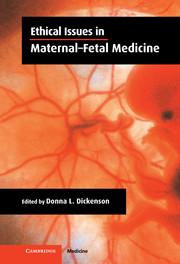Book contents
- Frontmatter
- Contents
- List of contributors
- Acknowledgements
- 1 Introduction: recent debates in maternal–fetal medicine – what are the ethical questions?
- 2 Overview: a framework for reproductive ethics
- I GENERIC ISSUES IN PREGNANCY
- II INCEPTION OF PREGNANCY: NEW REPRODUCTIVE TECHNOLOGIES
- III FIRST AND SECOND TRIMESTER
- IV THIRD TRIMESTER
- 17 Caesarean section: who chooses – the woman or her doctor?
- 18 Judgements of non-compliance in pregnancy
- V NEONATAL LIFE
- Index
18 - Judgements of non-compliance in pregnancy
from IV - THIRD TRIMESTER
Published online by Cambridge University Press: 29 September 2009
- Frontmatter
- Contents
- List of contributors
- Acknowledgements
- 1 Introduction: recent debates in maternal–fetal medicine – what are the ethical questions?
- 2 Overview: a framework for reproductive ethics
- I GENERIC ISSUES IN PREGNANCY
- II INCEPTION OF PREGNANCY: NEW REPRODUCTIVE TECHNOLOGIES
- III FIRST AND SECOND TRIMESTER
- IV THIRD TRIMESTER
- 17 Caesarean section: who chooses – the woman or her doctor?
- 18 Judgements of non-compliance in pregnancy
- V NEONATAL LIFE
- Index
Summary
Introduction
Medical knowledge regarding the ways in which women can actively pursue healthy pregnancies and the birth of healthy infants covers an increasingly broad spectrum of activities before, during and after the usual nine months of pregnancy. In fact, depending upon the clinical situation, the number and range of activities are such that, if a woman were to take all obstetrical advice seriously, she would be faced with a daunting list of instructions ranging from mere suggestions to strong professional recommendations. Few women could (or would want to) fully adapt their lives to the entire range of advice from physicians, midwives, nurses, nutritionists, physiotherapists and childbirth educators, and generally this is not a problem. In principle, professional advice is something that patients can choose to follow or not – this is the essence of informed choice (Faden and Beauchamp, 1986). In some instances, however, failure to follow professional recommendations elicits pejorative judegements of non-compliance, and while these judgements are provoked by a failure to comply with specific advice, typically they are applied to the patient as a whole. Moreover, even if the patient ultimately consents to the recommended course of action, she may continue to carry the label of non-compliant because of her initial efforts to resist medical authority, and this labelling frequently has repercussions for her subsequent interactions with health care professionals.
- Type
- Chapter
- Information
- Ethical Issues in Maternal-Fetal Medicine , pp. 285 - 302Publisher: Cambridge University PressPrint publication year: 2002
- 3
- Cited by

